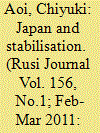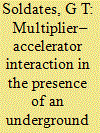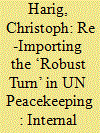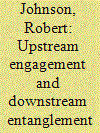| Srl | Item |
| 1 |
ID:
166681


|
|
|
|
|
| Summary/Abstract |
Over the last two decades, billions in aid money has been spent in highly insecure regions of conflict affected states in the hope that aid would lead to less violence and more stability. A recent wave of academic work on the impact of aid on violence has now amassed convincing empirical evidence that this hope is futile. Aid injected in highly insecure regions, where violence is a reality and insurgents retain some capacities, will increase, not dampen violence. This essay first provides a summary of the findings of the recent empirical literature. It then demonstrates that two causal mechanisms – predation and sabotage – explain why aid in highly insecure settings will likely lead to less, not more, stability. The essay then exemplifies these two causal mechanisms, using original qualitative and quantitative data from Afghanistan. It ends with a discussion of the implications for donors engaged in countries affected by conflict.
|
|
|
|
|
|
|
|
|
|
|
|
|
|
|
|
| 2 |
ID:
132225


|
|
|
|
|
| Publication |
2014.
|
| Summary/Abstract |
British attitudes towards military intervention following the campaigns in Iraq and Afghanistan have undergone what appears to be considerable change. Parliament has voted against the use of Britain's armed forces in Syria and the public are unenthused by overseas engagement. Conscious of the costs and the challenges posed by the use of British military power the government has been busy revamping the way it approaches crises overseas. The result is a set of policies that apparently heralds a new direction in foreign policy. This new direction is encapsulated in the Building Stability Overseas Strategy (BSOS) and the more recent International Defence Engagement Strategy (IDES). Both BSOS and IDES set out the basis for avoiding major deployments to overseas conflict and instead refocuses effort on defence diplomacy, working with and through overseas governments and partners, early warning, pre-conflict prevention and post-conflict reconstruction. Developing a number of themes that reach from across the Cold War to more contemporary discussions of British strategy, the goal of this special edition is to take into account a number of perspectives that place BSOS and IDES in their historical and strategic context. These papers suggest that using defence diplomacy is and will remain an extremely imprecise lever that needs to be carefully managed if it is to remain a democratically accountable tool of foreign policy.
|
|
|
|
|
|
|
|
|
|
|
|
|
|
|
|
| 3 |
ID:
104748


|
|
|
|
|
| Publication |
2011.
|
| Summary/Abstract |
Despite significant official development assistance and important contributions to past peace and stability missions, Japan remains outside the group of nations able and willing to participate in international stabilisation operations. Chiyuki Aoi argues that institutional limitations - in its legal and operational frameworks as well as its military doctrine - inhibit the mobilisation of Japan's capabilities and resources for stabilisation, depriving it of critical frontline experience.
|
|
|
|
|
|
|
|
|
|
|
|
|
|
|
|
| 4 |
ID:
171140


|
|
|
|
|
| Summary/Abstract |
Peace operations of the United Nations (UN) have changed significantly since the 1990s. The turn towards “stabilisation” operations increasingly allows the use of military force against armed groups. For some troop contributing armies, this means that peacekeeping has become the first occasion on which soldiers gain combat experience. Yet, what are the consequences of this development for eventual internal public security roles of armed forces? Contributing to discussions on conditions for organisational change, this article develops a model for blending the analysis of bottom-up adaptation and top-down military innovation with studies on civil-military relations. This model is used for examining military learning that resulted from the reciprocal relationship between the Brazilian military’s internal “Guaranteeing Law and Order” (GLO) operations and coercive operations against urban crime groups during the UN Stabilisation Mission in Haiti (MINUSTAH). The article finds that a complex interplay between bottom-up adaptation and top-down innovation – enabled by politicians who supported the transfer of lessons – led to a process in which internal missions and peacekeeping deployments mutually informed military change. Soldiers’ adaptation to coercive operations, changes in the legal framework for internal missions, and the development of appropriate doctrine for urban operations resulted in the institutionalisation of military learning.
|
|
|
|
|
|
|
|
|
|
|
|
|
|
|
|
| 5 |
ID:
159350


|
|
|
|
|
| Summary/Abstract |
This article introduces the underground economy into a standard multiplier-accelerator model with linear progressive income taxation. The main results are that this introduction increases the instability of the overall economy towards chaos, that tax policy plays a critical role in preserving stability even if in the sense of a uniform cycle and that the operation of the accelerator may be countering the negative effect of tax evasion on tax revenue.
|
|
|
|
|
|
|
|
|
|
|
|
|
|
|
|
| 6 |
ID:
170283


|
|
|
|
|
| Summary/Abstract |
Brazil has been the largest troop contributor and provided all force commanders to the UN Stabilisation Mission in Haiti (MINUSTAH, 2004–2017). As the military embraced a leading role in UN peacekeeping’s turn towards peace-enforcement, Brazil’s governments have increasingly relied on soldiers in public security – occasionally even portraying these operations as a sort of ‘peacekeeping at home’. Yet how has Brazil’s participation in MINUSTAH affected internal military operations? I argue that narratives of the military’s effectiveness in Haiti have been used to legitimise the growing scope of internal public security missions. Drawing on data from a questionnaire-based survey, interviews and focus groups with soldiers and officers, this paper argues that the experience in Haiti has fuelled troops’ demands for rules of engagement that resemble those in UN peacekeeping. Given the armed forces’ increasing bargaining power in Brazil’s politics, the military leadership has been able to successfully lobby in favour of changing parts of the legal framework for internal operations. Lessons from the ‘robust turn’ have been used to promote more coercive internal missions of Brazil’s armed forces. Yet it is impossible to fully reconcile the content of the military’s demands with the rule of law in a democracy.
|
|
|
|
|
|
|
|
|
|
|
|
|
|
|
|
| 7 |
ID:
186001


|
|
|
|
|
| Summary/Abstract |
This paper examines the role of United Nations (UN) peacekeeping operations in modern conflict. It advocates for a new peacekeeping doctrine for stabilisation operations. The UN has authorised four such stabilisation missions, wading into challenging frontiers of asymmetrical warfare, endemic conflict, and multidimensional mandates. This article begins by surveying discourse on stabilisation at the UN, among its key members, and among the academic community. It highlights the penchant for strategic ambiguity that has prevented the UN from establishing clear stabilisation doctrine for its Blue Helmets. It then analyses the two case studies of Haiti and the Democratic Republic of the Congo (DRC), the UN’s first two forays into official stabilisation operations. Evaluating them along the three axes of security, state consolidation, and political reconciliation, this article draws lessons learned and makes recommendations for a clear, modern UN stabilisation doctrine.
|
|
|
|
|
|
|
|
|
|
|
|
|
|
|
|
| 8 |
ID:
132277


|
|
|
|
|
| Publication |
2014.
|
| Summary/Abstract |
This article addresses Western recruitment and management of personnel from non-Western countries in armed forces as part of a strategy of state stabilisation, examining its risks and benefits. 'SFA' (Security Forces Assistance) to indigenous forces has long been practised by the West and seems to have returned in recent years in a new form with the creation of armies in Iraq and Afghanistan. However, while providing cheap, proxy substitutes for the West and offering opportunities for state-building, the policy creates its own problems and can have significant, negative consequences.
|
|
|
|
|
|
|
|
|
|
|
|
|
|
|
|